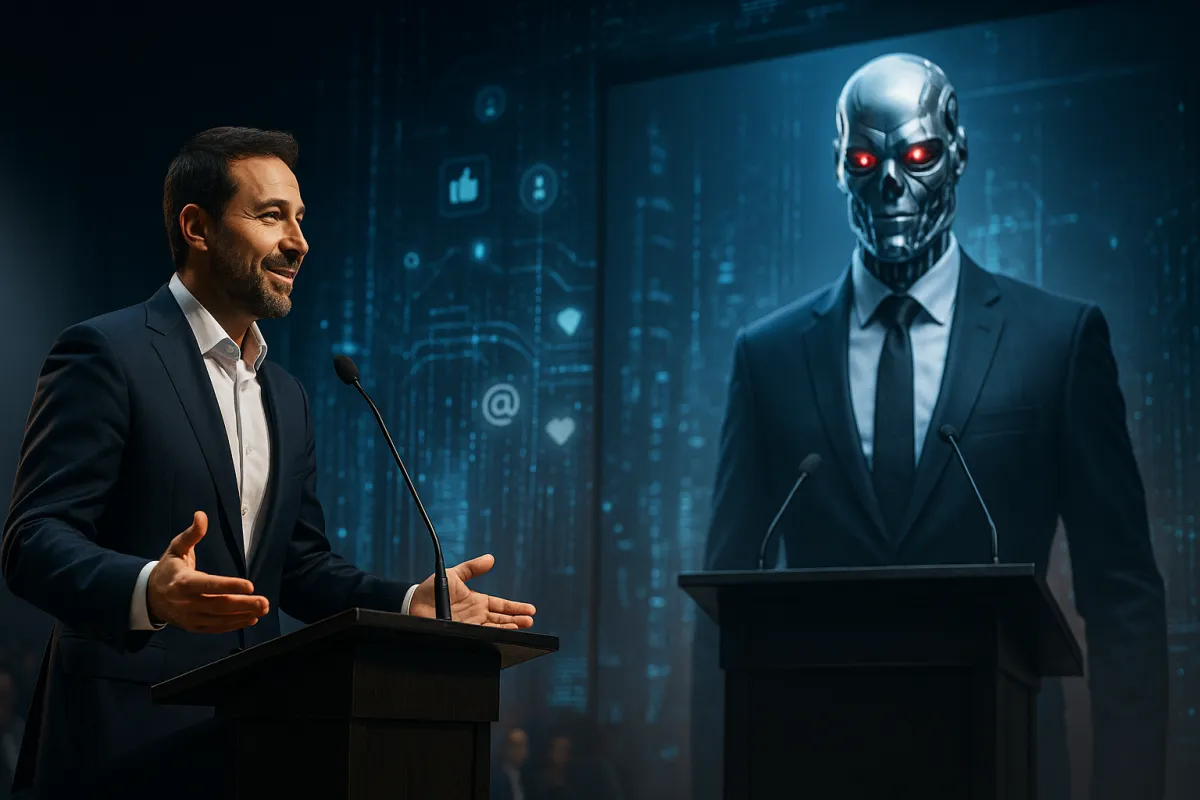
How Long Before All the Top Thought Leaders… Are AI Bots?
I recently was in an online group where the group owner/moderator asked the following questions:
💡 Are we just months away?
💬 Will anyone care?
🤖 Will the bots be more consistent… and better looking?
🙋🏽♂️ Or will human personality always win?
These aren’t science fiction questions anymore.
They’re the whispers echoing across boardrooms, masterminds, and social feeds.
The rise of AI-generated content isn’t a someday thing. It’s here. And it’s reshaping the very definition of influence.
When the Thought Leader Isn’t Human
Imagine stopping your scroll on a new LinkedIn voice of authority.
They’ve got a polished headshot, a stream of thoughtful posts, and a consistency most human creators could only dream of. Their following grows fast, their engagement is sharp, and their advice is eerily relevant to your exact struggles.
But here’s the kicker. They don’t really exist. At least, not in the flesh.
They’re an AI-powered persona, designed to optimize influence. And they’re competing with you, me, and every other entrepreneur trying to build credibility in the marketplace of ideas.
So the real question is no longer if AI bots will enter the thought-leadership space.
The question is: how long before they dominate it?
Are We Months Away from Termination?
Remember Terminator 3: Rise of the Machines? The premise was terrifying. Machines were quietly advancing until suddenly they weren’t just tools, they were the dominant force.
Now consider swapping those killer robots for AI “thought leaders,” and you can see why some people are uneasy.
We’re not talking about a distant dystopia.
In many niches, the rise is already underway. AI can pump out articles, podcasts, even keynote decks with a speed and polish no human can match.
Bots don’t get writer’s block. They don’t procrastinate. They don’t wonder if the lighting is flattering. They just… produce.
And in the attention economy, sheer consistency is intoxicating.
Volume plus competence equals visibility.
But here’s the truth the doomsday narratives miss: influence has never been just about production. It’s about connection, and that’s the one thing machines can’t authentically replicate, no matter how much they rise.
Will Anyone Care?
Humans have always believed we can read each other.
The early developers of Neuro-Linguistic Programming (NLP) even taught that “eye-accessing cues” revealed whether someone was thinking visually, auditorily, or kinesthetically.
Looking up and to the right? Supposedly they’re creating an image. Look down and left, they’re accessing feelings.
A scientific 2012 study published in PLoS ONE (Public Library of Science) provided strong evidence against those NLP claims through a series of three experiments, eventually debunking those claims, but the impulse behind them is still worth noting.
People want to understand what’s really happening in another person’s mind. That desire is human to the core.
Machines, on the other hand, don’t care about intuition.
They track clicks, measure engagement, and analyze patterns.
Impressive? Absolutely.
But the nuance of a trembling voice, a pause before answering, or the emotion hidden in someone’s eyes is still something only another human can fully connect with.
So will anyone care if their “thought leader” turns out to be an AI bot?
Yes. I certainly believe they will because people don’t just want information.
They want recognition, empathy, and the sense that someone else gets them. That’s not a dataset. That’s a distinctly human strength.
Will Bots Be More Consistent… and Better Looking?
To be blunt: YES.
AI never misses a post. Never flubs a keynote. Never shows up tired, cranky, or hungover.
And thanks to deepfake tech, they can be sculpted into any form to connect with a particular audience… diverse, attractive, and photogenic in ways most humans certainly aren’t on a Monday morning.
So where does that leave us?
Facing competition that is flawless, tireless, and scalable. And yet…
Or Will Human Personality Always Win?
Influence is more than posture and production. It’s trust. And trust is sticky.
People don’t follow thought leaders solely because they’re polished.
They follow because they’re relatable, vulnerable, and imperfect in a way that says: I’ve been where you are. I understand.
They follow because of authenticity.
An AI bot can simulate empathy, but it cannot live experience. It cannot speak about the nights you almost quit, or the tears you hid after a failed launch. It cannot confess mistakes that shaped your leadership.
And those are the moments that separate “content” from influence.
The Megafluence Position
At Megafluence, we don’t dismiss AI. We embrace it — responsibly.
AI can supercharge systems, scale production, and eliminate busywork.
But when it comes to thought leadership, real influence comes from credibility, trust, and ethical leadership.
Bots can amplify voices. They can’t replace them. Not if the voices are authentic, courageous, and built on a foundation of service.
So here’s our position: The marketplace is being flooded with bot-leaders.
But the humans who understand how to blend technology with truth; the ones who show up with personality, empathy, and a proven track record will rise above the noise.
What Do You Think?
So now it’s your turn:
Would you follow an AI thought leader if their insights were sharp and consistent?
Does it matter to you if the person behind the post is flesh and blood—or lines of code?
Will authenticity always win in the long run, or are we headed toward a world where personality is optional?
Drop your take in the comments. Debate it. Share it. Challenge it.
Because the future of influence isn’t coming “someday.” It’s arriving in real time. The only question left is: who—or what—will you choose to follow?
